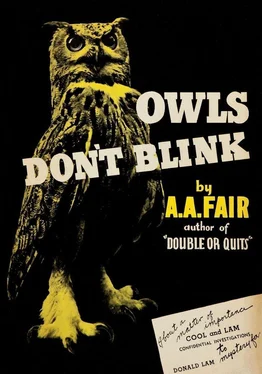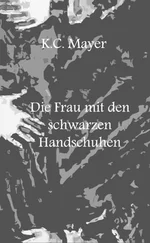The friends had convinced Miss Winton that she had merely heard a door slam. She had gone on upstairs to her apartment, but still only half convinced that it was not a shot she had heard, had looked at her watch to note the exact time. The time was then exactly 2:37. She estimated it had then been not over five minutes since she had heard the shot.
There was nothing in the paper as to how the police had happened to discover the crime. News of that mysterious telephone call of mine had apparently been deliberately suppressed. The newspaper explained that the police who stumbled upon the murder were “merely upon a routine tour of inspection.”
I read the news, smoked a cigarette, and went back up to the public typing agency.
Ethel Wells had pulled a proof of the letter for me.
I read it over.
“You think this will do the work?” I asked.
She said, “It rang the bell with me — as you may have noticed.”
“I noticed.”
She laughed up at me. “You were all eyes, as the saying goes.”
I said, “I need an address for the Silkwear Importation Company.”
“Three dollars a month entitles you to use the office as a mailing address. You can have as many letters sent here as you want.”
“Can I trust your discretion?”
“Which, I suppose, is a nice way of asking if I can keep my mouth shut if someone comes around asking questions?”
“Yes.”
“If it’s a postal inspector, what do I do?”
“Tell him the truth.”
“What’s that?”
“That you don’t know my name or anything about me.”
She turned that over in her mind for a few seconds, then said, “That’s an idea. What is your name?”
“On the books, it’ll be Cash . You’ve added three dollars to your month’s income, as well as the price of the typing.”
I went back to the hotel, went up to my room, opened a fresh package of cigarettes, sat by the window, and did a little thinking.
Bertha Cool was somewhere between New Orleans and Los Angeles. Elsie Brand would be running the office. It looked like a good time to get the information I wanted.
I picked up the telephone and placed a station-to-station call. It took about five minutes to get the call through. Then I heard Elsie Brand’s voice, crisp and businesslike, saying, “Hello.”
“Hello, Elsie. Donald talking.”
The hard, keen edge came off her voice. She said informally, “Oh, hello, Donald. Operator said New Orleans was calling, and I thought it was Bertha. What’s new?”
“That’s what I want you to tell me.”
“How come?”
“Bertha tells me she’s gone in for war work.”
“Didn’t you know?”
“No. Not until she told me.”
“She’s been working with it for about six weeks. I thought you knew.”
“I didn’t. What’s the idea?”
She laughed and said uneasily, “I guess she wants to make money.”
“Listen, Elsie, I’ve been associating with Bertha long enough so I object to paying long-distance telephone rates for the pleasure of listening to you beat around the bush. What’s the idea?”
“You ask her, Donald.”
“I could get pretty damned peeved about this in a minute,” I warned.
“Use your head,” she said suddenly. “You’re supposed to have brains. Why should Bertha want to get into war work? Why would you do it if you were in Bertha’s position? Figure it out for yourself, and quit pressing me for information. I’ve got a job to hold, and you’re just one of the partners.”
“Was it so she could make a claim that would exempt me from military service?”
There was silence at the other end of the line.
“Was it?”
“We’re having very nice weather out here,” Elsie said, “although I suppose I shouldn’t tell you that, because it’s a military secret.”
“It is indeed?”
“Oh, yes. By suppressing all information about the weather, we’ve taken a long step toward winning the war. One of the things we’re short on is newsprint. The Los Angeles Chamber of Commerce used to use up enough paper telling about the climate to cover with dense forest an area of nine thousand, six hundred and eighty-seven acres, assuming that the trees would be on an average of eighteen inches in diameter and would be growing at distances of ten and six-tenths feet, measuring from the center of the trunks. That assumes that the trees would have an average height of—”
“Your three minutes are up,” the operator broke in.
“You win,” I told Elsie. “Good-by.”
“By-by, Donald. Good luck.”
I heard the receiver click at the other end of the line, and hung up.
I sat back with my feet propped on a chair, thinking.
The telephone rang.
I picked up the receiver, said, “Hello,” and heard a man’s voice saying cautiously, “Are you Mr. Lam?”
“Yes.”
“You’re a detective, having offices in Los Angeles — a member of the firm of Cool and Lam?”
“That’s right.”
“I want to see you.”
“Where are you?”
“Downstairs.”
“Who is this?”
He said, “You’ve met me before.”
“Your voice is vaguely familiar, but I don’t place you—”
“You will when you see me.”
I laughed and said cordially, “Come on up.”
I dropped the receiver into its cradle on the telephone, grabbed my hat, topcoat, and briefcase, made certain the key to the room was in my pocket, slammed the door shut, locked it, and sprinted down the corridor. I slowed down as I neared the elevator shaft, walked past the elevators, on down to a turn in the corridor, and waited.
I heard an elevator door slide open, waited a few seconds, and peered cautiously around the comer.
There was only one man. He was hurrying down the corridor. There was something vaguely familiar about the way he held his shoulders, and that came as a surprise to me. I’d have bet ten to one that the call had been from the cops, making certain I was in the room before they started to sew the place up. The fact that this man was alone and that I really knew him was an agreeable surprise, but I didn’t start down the corridor until I’d placed him, and I didn’t do that until he made the turn to the left.
It was Marco Cutler.
Cutler was knocking at my door for the second time when I joined him. “Oh, good afternoon, Mr. Cutler.”
He whirled. “I thought you were in your room.”
“Me! Why, I just came in!”
He looked at the briefcase, the hat, the topcoat, said, I’d have sworn that I recognized your voice. I called your room just now.”
“Must have got the wrong number.”
“No. I told the operator very distinctly the room I wanted.”
I stepped back from the door and lowered my voice. “And someone answered the telephone?”
He nodded, and I could see sudden apprehension upon his face.
I said, “This may not be as simple as it sounds.” I took his arm, and moved away from the door. “Let’s go get the house detective.”
“You mean — you think there’s a burglar?”
I said, “It may be the police frisking the room. You didn’t give your name, did you?”
This time I could see the twitching of the little muscle at the corner of his left eye. “No-let’s get out of here.”
“Suits me,” I said. “Keep right on going.”
We started walking. He said, “I thought your voice sounded a little strange.”
“How,” I asked, “did you locate me?”
“It’s rather a peculiar story.”
“Let’s hear it.”
He said, “I looked up the landlady who owns that apartment. I told her that when you folks were finished with it, I’d like to move in. I said I didn’t want to put you out, but that I’d pay double the rent she was getting at the present time. I understood you only wanted it for a week and—”
Читать дальше












